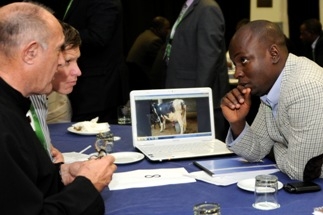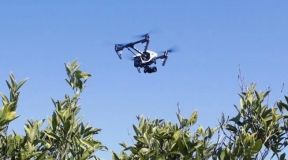Africa’s agri-food sector: A future for private-public partnerships
Africa’s agri-food sector: A future for private-public partnerships

Although the private and public sectors can be considered polar opposites of each other, it has become clear in the last few years, especially in the case of Sub-Saharan Africa, that both sectors are not only essential but must cooperate in order to achieve long-lasting and result oriented objectives.
Public-Private partnerships are imperative for leveraging the needed funds and sharing the risks of investments. Furthermore, the development of Public-Private partnerships strengthens democratic institutions, opens markets, as well as mobilizes and uses development resources more effectively.
According to Gavin Wall, Director for the Rural Infrastructure and Agro-industrial Division at FAO, “Only the private sector can make the investments required at a meaningful scale and in a sustainable way. This means that Africa is not different from other regions and that it can look to countries in Asia and Latin America, which have achieved growth in the output and value of their agricultural sectors, as a model for development. FAO, on the other hand, can play an important role in supporting governments to create the enabling environment, including policy development and capacity building of both public and private sector actors in areas such as technology, institutional organization and management.”
EMRC was established within this same frame of mind: to strengthen Africa’s private sector as a way to ensure sustainable growth. This can be achieved within the frameworks set out by the public sector, in particular in regards to Sub-Saharan Africa’s agricultural sector, which the majority of the continent’s population depends on. Since 2008 EMRC has regarded the global food crisis as an opportunity for countries with vast unlocked agricultural potential. This is the time for Africa to grasp the opportunity to turn agriculture into a viable solution that could provide millions of people with much needed income.
“We have worked tirelessly to involve all the actors in the private sector to garner growth within the continent’s agricultural sector. Without economic incentives, agriculture will not take off and food imports will increase, making many fertile rich countries further dependent on external products. At EMRC we believe that to achieve growth small, medium and large farming companies have to work together, share best practices and establish meaningful partnership with local, national and regional as well as international peers,” explains Idit Miller, EMRC Vice President and Managing Director.
In this regard, the AgriBusiness Forum, EMRC’s flagship event, was established with the particular aim to strengthen the agri-food sector in Africa, by encouraging partnerships, exchanging of best practices and attracting investments. The Forum, the largest pan-African agribusiness forum held annually on African soil, attracts a few hundred leaders and decision makers in the sector, including private entities, financiers, donors, industrialists, researchers, Governments, international organisations, NGOs, and others from North and South. It is a key meeting point for those who wish to take part in Africa’s agri-food sector growth and for investors coming from all four corners of the world.
In 2015, the Democratic Republic of Congo hosted the AgriBusiness Forum to spotlight its vast arable agricultural lands, of which almost 80 million hectares are still not used, and which, if well managed, can provide much needed income and sustainability for the country’s population. Economic growth in DR Congo is healthy. Gross Domestic Product (GDP) is expected to increase 8.7% in 2014. Congolese Prime Minister Augustin Matata Ponyo launched several initiatives that aim to transform DRC into an emerging country by 2030, paving the way for economic growth in the long term and social improvement.
According to DRC’s Minister of Agriculture, Jean Chrysostome Vahamwiti Mukesyayira “Our aim is to achieve inclusive growth and we have set ourselves goals for 2030, focusing on revitalizing the country’s dormant and forgotten agricultural sector,” he explains. “Our goal is to invest and attract investment to our vast and fertile lands, which is why we hosted a pan-African forum such as the AgriBusiness Forum,” he adds. “It is now that we must take the lead on agricultural matters and reverse the course of this sector that millions of people depend on.”
Achieving business success is key for the country, which is why MINAGRI is focusing on integrating three types of farming: family farms, medium-sized farms and industrial parks. All three can benefit from each other with the larger farming zones providing technology and resources to smaller outfits and family run farms providing much needed income and food to local communities. All three types of farming have on essential component: income generation.
This, according to EMRC President, Prof Monty Jones, is where the real issues are. “In the post independence era it was Africa’s misfortune to become addicted to development projects. Each project brought temporary relief and a sense of hope that was rarely justified in the project’s outcome and it was followed by another that was rarely more successful. Meanwhile the true source of national growth and wealth creation, human capital, was neglected.”
Jones adds that “The creation of human capacity will be futile if the institutional frameworks are not created to facilitate and promote employment and self employment. In this regard policymakers and development agencies must understand that the public sector is only a small player in national development and that its role is to facilitate the success of the much greater private sector.”
One must nonetheless not dismiss the role of the public sector. Without a strong public sector no African country can establish stability on all fronts. A robust public sector means institutions that work, policies that provide the basic and essential services to communities. However, certain sectors, in addition to smart and realistic public policies, can only achieve long-term and sustainable results with incentives - most importantly, financial incentives.
This is where the private sector can and must be further integrated to ensure real growth. A sector such as agriculture needs government support to provide appropriate irrigation, create markets and providing subsidies for inputs depends on public sector involvement. However, this sector also brings in much needed income and potentially thousands of jobs in a region where millions of youth are entering the job market. Putting the spotlight on where the real income can be generated is imperative.
The AgriBusiness Forum 2015, entitled "Toward Inclusive Growth: A Vision for Africa's Transformation” was held in March 2015 in Kinshasa DRC.

















